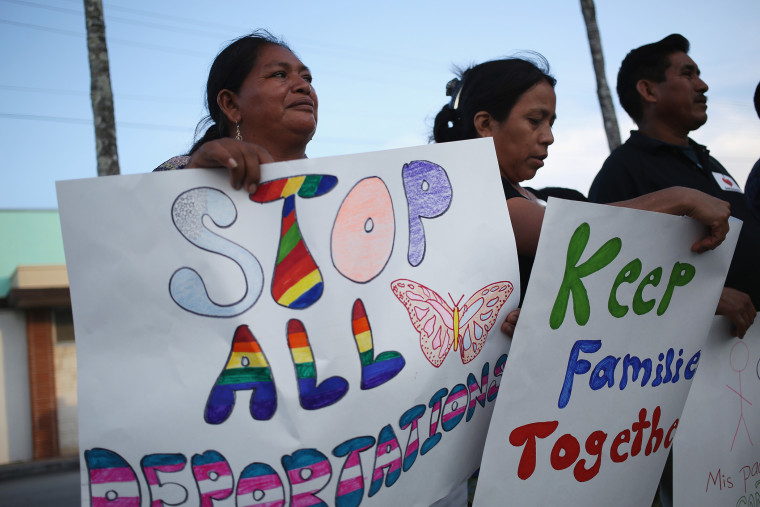The legal maxim "justice delayed is justice denied" pretty much sums up the procedural posture of the Obama administration’s appeal of the Republican lawsuit attacking the president's executive actions on deportation. The appeal—which asks the 5th Circuit Court of Appeals to vacate a hold placed on the deportation deferrals by U.S. District Judge Andrew Hanen—has been in the hands of a three judge panel of the court since it heard final argument on July 10.
But nearly three months later, the panel has failed to rule, leaving 5.5 million DREAMers and undocumented parents of U.S. citizens and lawful residents unable to apply for a deportation reprieve, undergo background checks and temporarily come out of the shadows until Congress sees fit to do its job and pass comprehensive immigration reform.
Were this a routine civil case, the panel’s delay probably wouldn’t raise an eyebrow. But this litigation is anything but routine.'
Were this a routine civil case, the panel’s delay in ruling probably wouldn’t raise an eyebrow. But this litigation is anything but routine. It directly impacts the lives of millions of Americans across the country -- real people like Andrew of Stow, Ohio, who wakes up every morning fearing that his mom, Maria, will be taken from him. Or Ashley of Findlay, Ohio, who fears her undocumented husband, Manny, will be deported to Germany.
The Texas immigration lawsuit is unquestionably a brazen political attack on the president’s November 20, 2014 executive actions on deportation. Before the ink was even dry on the deferred action guidance, the state of Texas, joined by mostly GOP governors and attorneys general from 25 states, shopped for a friendly judicial forum in which to launch their legal assault on the deportation reprieve. And they found one in the Brownsville, Texas, courtroom of U.S. District Judge Andrew Hanen, who’d made a name for himself in other cases excoriating the Obama administration for what he described as its "failure to enforce current United States law.”
RELATED: The cruel reality of Trump's deportation plan
Apparently Judge Hanen is unaware that under Obama more than 2 million immigrants have been deported, far outpacing any previous president. Nor does he seem to grasp that the undocumented population in the U.S. has stabilized, reflecting the lowest levels of unauthorized immigration in many years. In February, as many expected, Hanen issued an order temporarily blocking DACA and DAPA. The Obama administration appealed and, in March, the 5th Circuit granted its request to fast-track the case. On July 10, a three judge panel of the court heard argument on the merits of the case.
That was three months ago and still no ruling.
Compounding the frustration of delay, there’s little doubt about what this panel is going to do -- it’s all but certain to uphold Hanen’s injunction. We know that because in May, two of the three panel judges, Jerry E. Smith and Jennifer Walker Elrod -- both Republican appointees -- refused to temporarily lift Hanen’s hold on the administration’s immigration actions reasoning that “Because the government is unlikely to succeed on the merits of its appeal of the injunction, we deny the motion for stay and the request to narrow the scope of the injunction.”
Yet despite the uncertainty about when the 5th Circuit will rule, one thing’s for sure -- whatever the court decides, the final word on the Obama's executive actions will come from the U.S. Supreme Court. The GOP lawsuit is aimed at millions of mixed-immigration status American families and raises serious constitutional questions about whether the case is even properly before the court. In another challenge to the immigration executive actions brought by Maricopa County Sheriff Joe Arpaio, U.S. District Judge Beryl Howell dismissed the suit as improper, ruling that that “The role of the Judiciary is to resolve cases and controversies properly brought by parties with a concrete and particularized injury -- not to engage in policymaking better left to the political branches.” Moreover, observed another panel of the 5th Circuit earlier this year, the question of standing to sue the president is “especially rigorous,” when the lawsuit requires the court to decide whether an action taken by the commander-in-chief is unconstitutional.
RELATED: Unforced errors stack against immigration actions
But time is short. The Supreme Court begins its term this week. Unless the 5th Circuit rules soon -- like in the next two or three weeks -- it’s highly unlikely the Supreme Court will be able to decide the case before June 2017. That means the panel’s protracted delay will effectively leave 5.5 million low enforcement priority undocumented immigrants and their families in immigration limbo until well after Obama leaves office.
The panel’s delay feeds directly into the strategy of the GOP plaintiffs who clearly brought the suit to block the implementation of DAPA and DACA. Of course it’s impossible -- indeed counterproductive -- to speculate about why the 5th Circuit judges may be is taking so long to decide a case of such magnitude. But one thing is certain: It’s time for Judges Smith, Elrod and Carolyn King to rule. Further delay serves no purpose. To the contrary, it now threatens to deprive millions of American families of the justice they deserve.
David Leopold practices immigration law in Cleveland, Ohio, and is former president of the American Immigration Lawyers Association.
